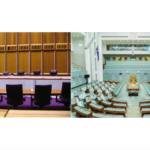Bullying and Harassment are Rife in the Legal Profession

Tackling sexual harassment and bullying in the legal profession is a high priority for regulators in Australia according to a research report published by the International Bar Association (IBA) this month.
The International Bar Association (IBA) is the world’s leading international organisation of legal practitioners, bar associations, law societies, law firms and in-house legal teams.
The IBA influences the development of international law reform and shapes the future of the legal profession throughout the world. It has a membership of more than 80,000 lawyers, 190 bar associations and law societies, and 200 group member law firms, spanning over 170 countries.
The IBA’s latest research study of more than 70 regulators and legal bodies shows that the problems in the Australian legal profession urgently need tackling.
High rates of bullying and sexual harassment
The survey etches findings of another IBA survey of lawyers which was published in 2019. It showed that the Australian legal profession has one of the highest rates of sexual harassment in the world. Approximately 30 per cent of Australian respondents to the global survey of 7000 lawyers reported they had been sexually harassed at work and 60 per cent said they had been bullied.
While some believe that the figure may actually be positive – in terms of indicating that reporting is encouraged – those working within the legal profession also acknowledge that both sexual harassment and bullying are problems that the profession as a whole has been grappling with for some time.
Even though both sexual harassment and bullying are prohibited under the Fair Work Act 2009, bullying and sexual harassment are becoming big problems for Australian employers. Statistics recently released from Government insurer iCare, show that psychological injuries double every four years.
‘Psychological injuries’ in the workplace are on the rise
Worker’s compensation claims for psychological injuries are growing by 13 to 17 per cent per year. The statistics also show that only half of the people who leave the workplace for mental health reasons are able to return to work within six months, in comparison to 90% of people who have physical injuries.
Work pressures, bullying and harassment are driving the majority of the claims, according to the iCare data, but so are anxiety and depression, which can be standalone mental illnesses or side-effects of the trauma that can result from bullying and sexually harrassment, particularly when it has been endured over a prolonged period of time.
Law reform means Judges will be held accountable for misconduct
Last year when it was in power, the Morrison Government agreed to adopt some of the recommendations of the Respect@Work report by Sex Discrimination Commissioner Kate Jenkins, which was based on a national survey conducted in 2018 which showed that about a third of people had been sexually harassed at work.
The reforms mean that public servants such as members of parliament, magistrates and judges face dismissal in the event they are found to have engaged in sexual harassment.
Until now, politicians and judges have been considered exempt from the Act due to the fact they are technically not the complainant’s employer.
This is a positive step forward. Law reform and creating safe, respectful workplaces through good leadership and establishing healthy workplace cultures are important. So is education, about how to set personal boundaries and what ‘consent’ means.
Calls for harsher punishments for perpetrators
But it’s also becoming increasingly important to ensure that perpetrators are punished accordingly.
‘A slap on a wrist’ does nothing to deter behaviour and it does nothing to encourage reporting either.
There are also calls to put an end to non-disclosure agreements which often mean that complainants are bound to secrecy and misconduct remains ‘swept under the carpet.’
In the wake of the high-profile trial of former Hollywood mogul Harvey Weinstein and the #MeToo movement, California recently introduced a new law designed to bring all types of workplace harassment ‘out of the shadows’.
Should we put an end to non-disclosure agreements?
Laws were introduced in California in 2019 which stopped employers from making employees sign non-disclosure agreements (NDAs), in circumstances involving sexual harassment. Recent amendments to that law go further, strengthening the existing law, and broadening the application to include all forms of workplace harassment and discrimination, including sexual harassment, bullying and harassment, or discrimination based on race, religion, color, national origin, disability, and gender.
Under the new laws, employers can only apply NDAs at the request of an employee. Settlement agreements can include provisions that prevent the disclosure of the amount of money paid to resolve a matter, as well as confidentiality clauses related to threatened or unasserted claims that have not been officially filed with a court or administrative agency.
Perhaps it is time we too considered similar law reform so that perpetrators can’t hide behind confidentiality agreements and buy silence, and so that those companies and organisations which fail to act on misconduct can also be identified.







